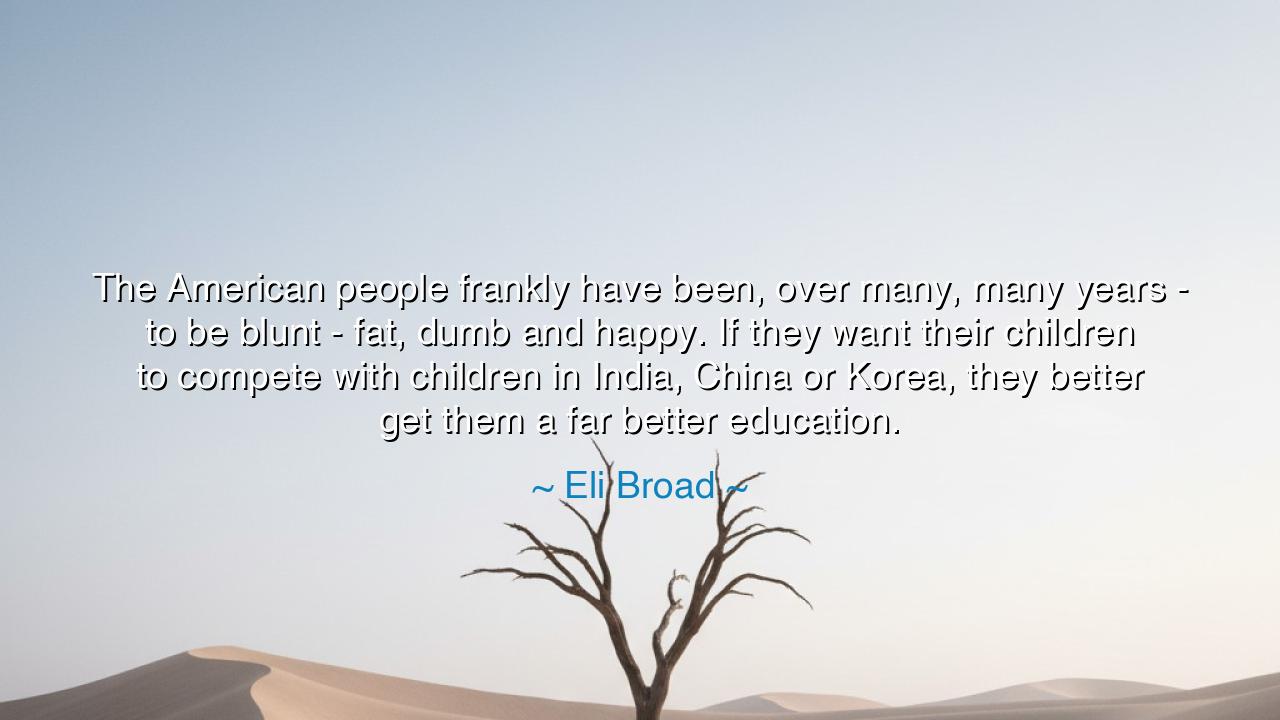
The American people frankly have been, over many, many years - to
The American people frankly have been, over many, many years - to be blunt - fat, dumb and happy. If they want their children to compete with children in India, China or Korea, they better get them a far better education.






The words of Eli Broad, “The American people frankly have been, over many, many years — to be blunt — fat, dumb and happy. If they want their children to compete with children in India, China or Korea, they better get them a far better education,” are a trumpet blast meant to awaken a sleeping nation. Though sharp in tone, his message is born not of disdain, but of warning — the cry of one who sees comfort turning into decay, and prosperity dulling into complacency. Broad, a man who built empires in business and devoted his later life to reforming education, understood that ignorance is the silent enemy of greatness. His words remind us that a nation’s wealth means nothing if its mind is untrained and its spirit unchallenged.
To understand the origin of this quote, we must see the world as it stood in Broad’s time. The early twenty-first century was an age of abundance for America — an age of smartphones, skyscrapers, and ease. Yet beneath the glitter of success, the foundation of education was weakening. Schools were failing to keep pace with the demands of a rapidly changing world. Meanwhile, nations once considered “developing,” like India, China, and Korea, were rising through discipline, investment in learning, and reverence for knowledge. Their children were mastering mathematics, science, and technology while many American classrooms grew distracted by comfort and entitlement. Broad’s rebuke was not meant to shame, but to shake — to awaken a people lulled by luxury into forgetting that progress requires effort.
His words recall the wisdom of the ancients, who often warned that comfort is the prelude to downfall. The Greeks spoke of hubris, the pride that blinds men to their decline. The Romans, too, once grew rich and idle, delighting in bread and games while their enemies sharpened their swords beyond the frontier. In the same spirit, Broad saw the danger of a nation too content to question itself. “Fat, dumb and happy” was his modern echo of the old warnings — a call to cast off complacency before it calcified into decline. For when a people cease to hunger for knowledge, their future begins to starve.
To illustrate this truth, one might look to the story of Japan after World War II. Devastated, humbled, and stripped of its power, Japan could have surrendered to despair. Instead, its leaders rebuilt not just cities, but minds. They poured their energy into education, into crafting a generation of thinkers and innovators who would resurrect the nation through intellect and diligence. In a few short decades, Japan rose from ruin to global leadership — not by wealth or arms, but by wisdom. Their transformation is the living proof of Broad’s conviction: that education is the true engine of competition, the source of both national pride and survival.
Yet Broad’s warning also carries a moral layer. When he speaks of American children competing with those of other lands, he is not merely invoking rivalry — he is calling for renewal of purpose. Education, in his eyes, is not about defeating others, but about transcending ignorance and mediocrity. He believed that a free people must never allow their minds to grow dull, for ignorance is the slow death of liberty. A democracy without knowledge is like a body without a heart — breathing, but lifeless. To educate, therefore, is not only to prepare for work, but to preserve freedom itself.
There is, too, a touch of sorrow in Broad’s truth. He saw that wealth, once the reward of labor, had become a cushion against it. The same abundance that once inspired exploration now risks nurturing apathy. The American dream, born of courage and struggle, was losing its sharpness — and Broad sought to restore its edge through the fire of education reform. Like a prophet calling the people to remembrance, he urged America to return to its first virtue: the belief that knowledge, not comfort, secures the future. To be “happy” is not wrong — but happiness without growth, without discipline, becomes the enemy of greatness.
Let this, then, be the lesson of Broad’s words: never grow content in ignorance, and never confuse comfort with progress. A nation — like an individual — must keep learning or begin dying. Parents must demand excellence for their children, not ease; teachers must kindle curiosity, not conformity; leaders must prize intellect as fiercely as they once prized power. For in a world where knowledge moves faster than time itself, only the educated can remain free.
So, O children of the modern age, take heed: wealth fades, power shifts, but wisdom endures. The nations that rise are those that never stop learning, and the hearts that triumph are those that refuse to grow dull. Be not “fat, dumb, and happy,” but lean in mind, awake in spirit, and relentless in your pursuit of truth. For the destiny of a people — and of each soul among them — is written not in their comfort, but in their courage to learn.






AAdministratorAdministrator
Welcome, honored guests. Please leave a comment, we will respond soon